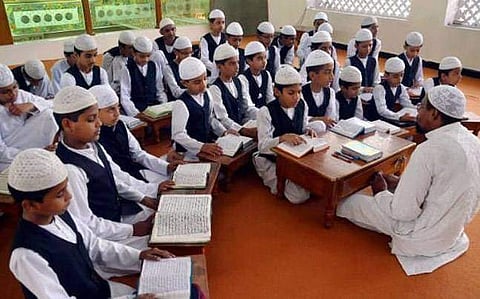

The Uttar Pradesh government has cleared a proposal to include books published by the National Council of Educational Research and Training (NCERT) in the curriculum taught by madrasas in the State. Courses in mathematics, science, social sciences, geography, and home science will be made mandatory for madrasa students from the next academic year. This will apply to 8,521 madrasas that have registered for the central government's madrasa modernisation scheme.
Until now, these subjects are taught to students till class eight in the madrasa while they are optional for higher classes. In addition, the Arabic and Deeniyat (religion) syllabus is also being revamped by spreading the subject matter from standards I to XII. The state government has taken expert advice from Aligarh Muslim University (AMU), Lucknow University, Khwaja Moinuddin Chishti Urdu Arabi Farsi University, Lucknow-based Integral University, Nadwatul Ulama and other prominent seminaries for syllabus revision.
Deputy chief minister and education minister Dinesh Sharma tweeted: "After approval from the State government, Uttar Pradesh Madrasa Board has started preparation to teach students from NCERT books." He said the initiative is aimed at increasing employment opportunities for madrasa students and equip them to compete with peers.
A draft of the revamped syllabus has been prepared by the State’s Minority Welfare Department along with the UP Madarsa Board of Education. It will be finalised after a meeting with the stakeholders including madrasa principals, teachers and members of the Muslim community in November-December.
Maulana Rashid Khalid Firangi Mahali, a member of the All-India Muslim Personal Law Board, welcomed the move to bring about uniformity in education.
In August this year, the State government launched a portal of the UP Madrasa Board for online registration of all Islamic educational institutions in a bid to check alleged "irregularities". However, despite two deadline extensions, 2,682 madrasas have not yet furnished their details on the website. Even teachers will receive their salary online according to the new proposal.
